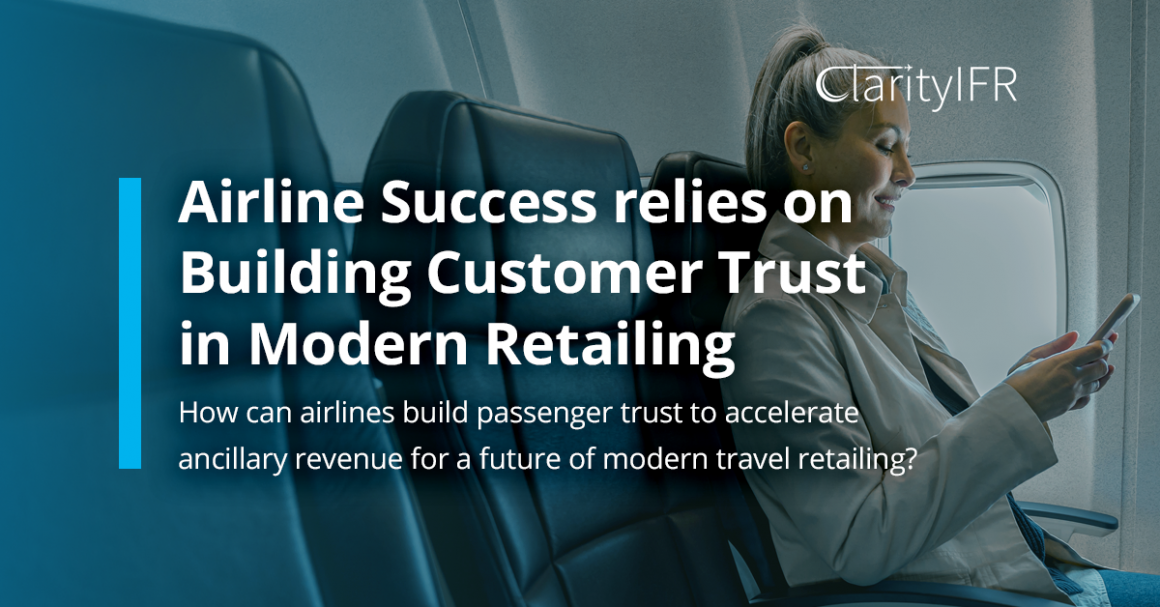Trust is at the heart of effective customer relationships. So, how can airlines build passenger trust to accelerate ancillary revenue for a future of modern travel retailing?
One of the biggest emerging trends in the airline sector over the last few years is the concept of passenger self-serve ‘buy onboard’ or order to seat.
The aviation sector is obsessed by digital answers, or to even reinvent themselves as retailers. Making a digital store available for browsing and purchasing is achievable – for passengers’ own devices and for the assistance of crew engagement.
During the pandemic, with the need for social distancing and desire for innovation, self-service became the new normal and is today’s key facilitator of interaction between brands and consumers.
Travellers want greater control of their own experience, as airlines evolve their digital strategy, both inside and outside of the cabin, self-serve applications enhance the world of digital retail.
Like existing leading retailers worldwide, ClarityIFR’s vision is to put the customer at the centre; to provide airlines with a flexible offer and order solution that intelligently enables airlines to retail and distribute a broad choice of tailored offers to passengers. Orders can be fulfilled and delivered with ease on an integrated platform, resulting in value creation for each step of the process.
Consumers appreciate a little more ease, accomplishing things without difficulty. If the traveller can make transactions themselves, the store is open for the entire flight.
To challenge traditional models often sounds exciting, but airlines must first establish consumer trust and confidence as these will greatly impact the passenger onboard spend. If you’re a passenger, are you going to spend more onboard because you can self-serve? Will you buy that extra coffee because you don’t have to wait for the arrival of the trolley, or perhaps a duty-free item, because you can now order from the convenience of your mobile phone? Clearly the answer is “only if you have trust and confidence in that process”.
Introducing the $40 billion opportunity to Modernise Airline Retailing
Building trust creates the opportunity to sell non-airline products and services through offer and order-based retailing.
Airlines have a significant opportunity to increase their ancillary revenue by addressing the trust issues that prevents travellers from booking non-air products through them. This lack of confidence represents a potential $40 billion opportunity for airlines that can effectively resolve traveller trust.
It’s been the norm for travellers to purchase directly from the service provider – limiting the range of products and services the airlines can sell. In essence, the trolley only comes down the aisle once or twice a journey each flight, and duty-free is only open for an estimate of half an hour. If you are only offering the same product range that you sell today for a limited time, a single digit % uptick revenue is almost certain. However, when an airline expands its offering through offer-and-order management, this number grows far more significantly.
Top companies recognise the significance of trust and are committed to meeting customer expectations consistently. They endeavour to enhance their practices of building customer trust and customer-centricity. For example, the reason why Amazon is a global phenomenon is due to the level of trust it’s built with its customers all while modernising the way users’ shop. This trust means their customers can reduce the time consumed shopping around; introducing multiple choice from multiple sellers in one place, product recommendations and competitive prices to name a few.
Amazon excels at customer fulfilment, it’s arguably the clearest example of technology-driven innovation focusing on its customer at the centre. This level of trust is what airlines must aspire to if they want to strive to increase passenger spend, and to transition to a traveller-centric approach to retailing products and services now and for the future.
Challenge traditional retailing models
To challenge traditional retailing models, it means airlines must prioritise data collection and analysis to satisfy customer expectations. A significant way to accelerate trust with consumers is for airlines to adapt and adjust to market conditions and predictive shopping patterns in real-time by constructing relevant and target-group specific offers.
Airlines already hold existing access to a great deal of customer data that’s enriched with behavioural insights, and by prioritising data collection and analysis, they shall unlock:
- Greater targeted offers driven by continuous customer searches, purchasing history and pricing algorithms that will increasingly improve customer engagement and satisfaction.
- Customers will benefit from attractive, tailored offers that creates better conversion rates.
- Overall, improving customer choice based on demand forecasting will optimise sell-through rate, reduce costs and increase supply-chain efficiency.
Knowing what customers want, how they like to shop and the types of offers and incentives will encourage customers to part with their hard-earned cash. Trust is about the importance of understanding the customer journey and to make great effort to understand their wants and needs.

